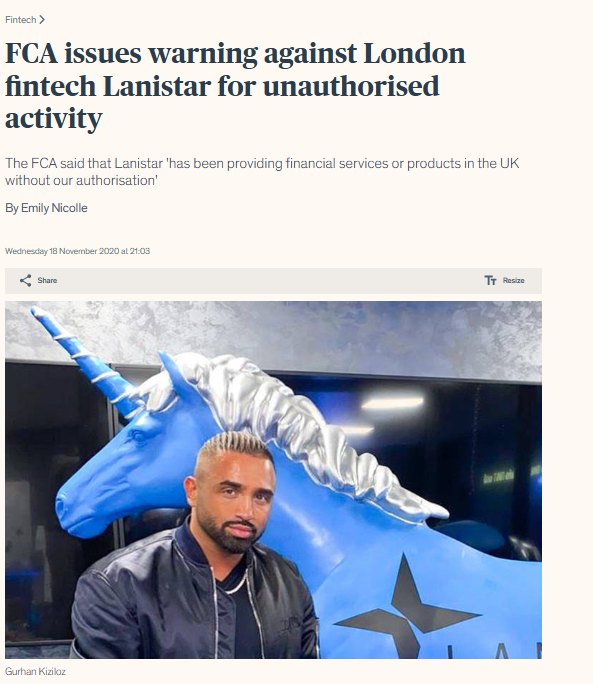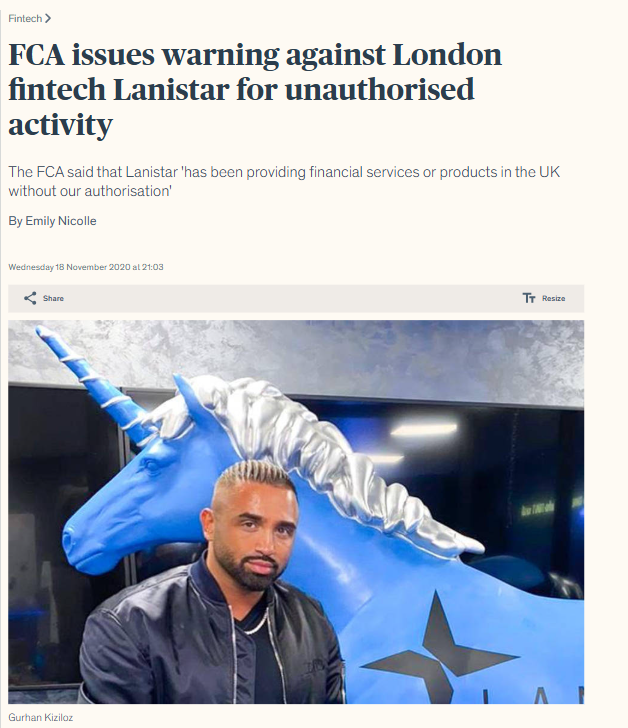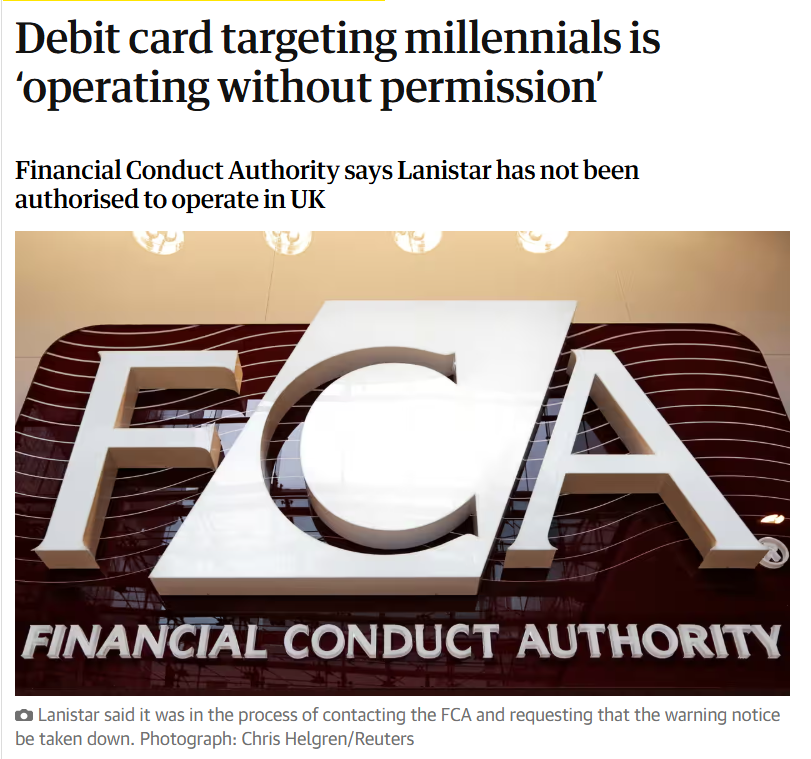The Financial Conduct Authority (FCA), the United Kingdom’s financial regulatory body, has issued a stern warning against London-based fintech company Lanistar for allegedly providing financial services or products without proper authorization. The FCA’s alert, published on November 18, 2020, highlights concerns about Lanistar’s operations, which appear to target young UK consumers, particularly Generation Z and millennials, through aggressive marketing campaigns. This article delves into the details of the FCA’s warning, Lanistar’s business model, its ambitious claims, and the broader implications for consumers and the fintech industry.
Background of Lanistar and Its Operations
Lanistar, a London-headquartered fintech startup, has positioned itself as an innovative player in the financial services sector, claiming to develop “the world’s most secure card.” The company, led by Chief Executive Officer Gurhan Kiziloz, has garnered significant attention through a high-profile marketing campaign launched on November 16, 2020. The campaign leveraged the reach of social media influencers, sports personalities, and celebrities to promote its products to younger demographics. Notable figures, including footballer Luis Suarez, Love Island contestants, and TikTok influencers, were paid to endorse Lanistar’s offerings on platforms like Instagram and Twitter.
Lanistar’s flagship product is a polymorphic card, which the company claims incorporates advanced security features such as a keypad and display for generating one-time PINs and security codes. The card, expected to be available from January 2021, is marketed as a revolutionary payment solution designed to enhance user security and convenience. Lanistar has also announced partnerships with established financial institutions, including Mastercard, which was set to issue the cards following a partnership agreement signed in June 2020. Additionally, the company stated that its e-money accounts would be provided through a partner firm, though specific details about this partnership remain undisclosed.
The fintech has been ambitious in its financial projections, claiming to have raised over £15 million in funding from the CEO’s family members in July 2020. Lanistar’s leadership has expressed its goal of achieving a £1 billion valuation by the end of 2020, a bold target for a company still in its early stages. To attract users, Lanistar introduced a waiting list for its polymorphic card and offered three account tiers, ranging from a free option to a premium plan costing £14.99 per month. The company also reported employing 400 staff across offices in London, Athens, and Macedonia, signaling its intent to scale rapidly.

The FCA’s Warning and Regulatory Concerns
The FCA’s warning against Lanistar underscores the regulator’s commitment to protecting consumers from unauthorized financial services providers. According to the FCA’s statement, Lanistar “has been providing financial services or products in the UK without our authorization.” The regulator emphasized that almost all firms and individuals offering, promoting, or selling financial services or products in the UK must be authorized by the FCA. Failure to obtain such authorization raises significant red flags, as it suggests that the firm may not adhere to the regulatory standards designed to safeguard consumers.
The FCA’s concerns are particularly acute given Lanistar’s aggressive marketing tactics, which target younger, potentially less financially savvy consumers. The use of social media influencers and celebrities to promote financial products can amplify risks, as these endorsements may create a false sense of trust or legitimacy. The regulator advised consumers to exercise caution when dealing with Lanistar, warning that unauthorized firms may not offer the same protections as those regulated by the FCA. For example, consumers engaging with unauthorized firms may have limited recourse in the event of financial loss or fraud.
The FCA’s alert also reflects broader challenges in regulating the rapidly evolving fintech sector. As startups like Lanistar push the boundaries of financial innovation, regulators must balance the need to foster innovation with the imperative to protect consumers. The FCA’s proactive stance in issuing the warning demonstrates its commitment to maintaining a robust regulatory framework, even as new players enter the market with ambitious promises.
Implications for Consumers
The FCA’s warning serves as a critical reminder for consumers to exercise due diligence when engaging with financial services providers, particularly those marketed through social media. The allure of innovative products like Lanistar’s polymorphic card, combined with celebrity endorsements, can make unauthorized firms appear legitimate. However, consumers who interact with such firms may face significant risks, including financial loss, lack of regulatory protections, and potential exposure to scams.
To protect themselves, consumers should verify whether a firm is authorized by the FCA before engaging with its products or services. The FCA’s website provides a Financial Services Register, which allows users to check the authorization status of firms and individuals. Additionally, consumers should be wary of high-pressure marketing tactics, overly ambitious claims, and offers that seem too good to be true. In Lanistar’s case, the promise of “the world’s most secure card” and a £1 billion valuation may raise skepticism, particularly given the company’s lack of regulatory approval.
The FCA also encourages consumers to report any suspicious activity or unauthorized firms to its consumer helpline or website. By doing so, individuals can help the regulator identify and address potential risks in the financial services sector, contributing to a safer marketplace.

The Broader Fintech Landscape
Lanistar’s case is emblematic of the opportunities and challenges within the fintech industry. The sector has experienced explosive growth in recent years, driven by technological advancements, changing consumer preferences, and increased access to capital. Fintech startups are disrupting traditional financial services by offering innovative solutions, from digital payments to blockchain-based platforms. However, this rapid evolution has also created regulatory gaps, as startups often operate in gray areas that existing frameworks struggle to address.
The FCA has been proactive in adapting to these changes, implementing initiatives like the Regulatory Sandbox, which allows fintech firms to test innovative products in a controlled environment. However, firms like Lanistar, which appear to bypass regulatory requirements, underscore the need for continued vigilance. The FCA’s warning sends a clear message to the fintech community: innovation must be accompanied by compliance.
For Lanistar, the FCA’s warning could serve as a turning point. If the company successfully addresses the regulator’s concerns and secures the necessary authorizations, it may emerge as a credible player in the fintech space. Conversely, failure to comply could damage its reputation and hinder its growth prospects. The outcome will likely depend on Lanistar’s ability to demonstrate transparency, build trust with regulators, and deliver on its ambitious promises.

Lessons for the Fintech Industry
The Lanistar case offers several lessons for fintech startups navigating the regulatory landscape:
- Prioritize Regulatory Compliance: Obtaining the necessary authorizations from regulators like the FCA is non-negotiable. Startups must invest in legal and compliance expertise to ensure they meet regulatory standards from the outset.
- Be Transparent with Consumers: Clear communication about partnerships, product features, and regulatory status can build trust and reduce the risk of scrutiny. Lanistar’s lack of transparency about its partner firm likely contributed to the FCA’s concerns.
- Leverage Responsible Marketing: While social media influencers can amplify a brand’s reach, fintech firms must ensure that marketing campaigns are ethical and compliant with advertising standards. Misleading or overly aggressive promotions can attract regulatory attention.
- Engage with Regulators Early: Proactive engagement with regulators can help startups navigate complex requirements and avoid public warnings. Lanistar’s decision to contact the FCA after the warning suggests a reactive approach, which may have been avoided with earlier dialogue.
The Role of Partnerships in Fintech
Lanistar’s reliance on partnerships with FCA-authorized firms and Mastercard highlights the importance of collaboration in the fintech ecosystem. Many startups lack the resources or expertise to obtain full regulatory authorization, making partnerships with established players a viable strategy. However, these partnerships must be structured carefully to ensure compliance and clarity. For example, Lanistar’s announcement that its e-money accounts would be provided by a partner firm raises questions about the partner’s identity, role, and regulatory status.
Mastercard’s involvement as the card issuer also underscores the role of traditional financial institutions in supporting fintech innovation. By partnering with startups like Lanistar, established players can tap into new markets and technologies while lending credibility to emerging brands. However, such partnerships carry risks, as the reputation of the established firm may be impacted by the startup’s missteps.
The Future of Lanistar
As of November 2020, Lanistar’s future remains uncertain. The company’s ability to resolve the FCA’s concerns will be critical to its success. If Lanistar can secure the necessary authorizations, clarify its partnerships, and deliver on its product promises, it may carve out a niche in the competitive fintech market. The polymorphic card, with its advanced security features, has the potential to appeal to security-conscious consumers, particularly in an era of rising cyber threats.
However, Lanistar faces significant challenges. The FCA’s warning may deter potential customers and investors, while the company’s ambitious valuation target of £1 billion appears optimistic given its early-stage status. Additionally, the fintech market is highly competitive, with established players like Revolut, Monzo, and Starling Bank already commanding significant market share. To succeed, Lanistar must differentiate itself through innovation, compliance, and customer trust.
Conclusion
The FCA’s warning against Lanistar serves as a cautionary tale for fintech startups and consumers alike. For startups, it underscores the importance of regulatory compliance, transparency, and responsible marketing. For consumers, it highlights the need to verify the legitimacy of financial services providers, particularly those promoted through social media. As the fintech industry continues to evolve, regulators like the FCA will play a critical role in ensuring that innovation does not come at the expense of consumer protection.
Lanistar’s response to the FCA’s warning will shape its trajectory in the coming months. By addressing the regulator’s concerns and building a compliant, transparent business model, the company has an opportunity to regain trust and achieve its ambitious goals. For now, consumers are advised to approach Lanistar with caution, prioritizing firms that are fully authorized by the FCA.







